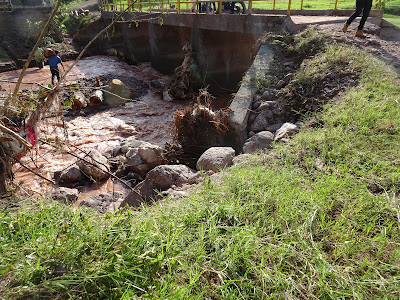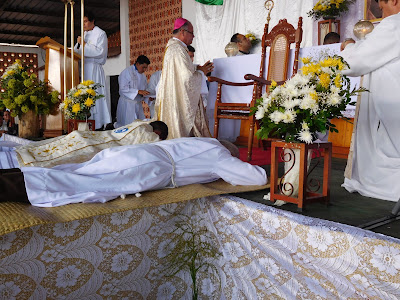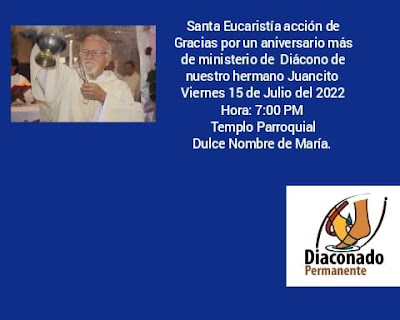In my visits to rural villages, I often ask people how they are doing and, especially, how are the crops.
The past week or so I’ve been hearing concern about the subsistence crops, especially the beans.
We’re in the middle of the rainy season and it has been raining a lot.
In some areas this has meant the ground is soaked - and there is concern about the harvest.
In other areas of the country there is concern about drought. There is a dry corridor, mostly in the south of the country which borders El Salvador.
I have recently come across two articles on the crisis of food insecurity here.
Honduras has about 10,225,526 inhabitants, 43% are children. According to the World Food Program, about 2.6 million are in a crisis situation. Another report suggests that this number could increase by half a million in the next three months.
One serious problem is the climate – too much rain in some areas, too little in others.
But there are other factors.
There have been significant price increases.
Fuel is up significantly.
The price of public transportation has almost gone up. Taxis in Santa Rosa de Copán used to be 20 lempiras; the most recent I paid was 35 lempiras. Bus fares have also risen.
The price of fertilizers has sky-rocketed; a few weeks ago, some one told me that one basic agricultural input had more than doubled in price.
The basic food basket is up to 60% of the minimum wage.
Even the price of bottled water has gone up. A large water container used to be 20 or 22 lempiras. It’s now 25.
Inflation at the end of 2021 was 5.32%.
The extreme rains in our area have caused washouts of roads as well as landslides.
A few weeks ago, at least two villages in our parish were incommunicado – one for a landslide, the other for a washed out road. The municipality helped the first community; but the other community (in a different municipality) received no help and so they went out and cleared a “road” through a stream bed so that vehicles could come through.
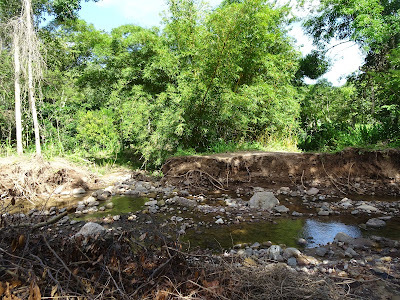 |
| The road into La Colonia was washed out in one place. |
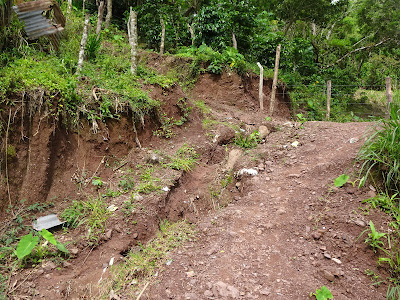 |
Las Pavas has suffered landslides.
|
And this is not the worst time for rains. We often get hurricanes in October and November. With a soaked earth, who knows what damage could result.
A year ago we had some workshops for forming emergency committees. I need to remind people to make sure they are organized in their villages and are on the watch for dangers and potential disasters.
In the midst of this, migration continues. I keep hearing about people I know who have left. Sunday, at Mass, people asked for prayers for some people on the journey north and for some who had arrived in the US.
The criminal deaths of migrants abandoned in a truck in El Paso don’t deter people. When things are desperate, people seek a way out.
A few days after the El Paso deaths, I was giving a ride to some folks for a parish meeting. One woman told of hearing the mother of one of those killed. Her son and several others from a town in the nearby department of Santa Barbara had left because they could find no employment. They had finished their education, but as they went around seeking jobs, they were often told they wouldn’t be hired because they had no experience.
In the midst of this, we go on, doing what we can.
The parish’s coffee field seems to be doing well and people keep on coming out to volunteer. Last week I went out to a distant community to pick up people early in the morning. They got done early and so I gave some of them a ride home (more than an hour away (in the early afternoon.
I keep on getting out to some villages.
Last Saturday I got to Debajiados for their feast day Mass. It’s a distant and very poor area – but the tiny church was filled with people from the community as well as from a nearby village in the neighboring parish. (Someone asked me if I could find some support for a new church since there is very small.)
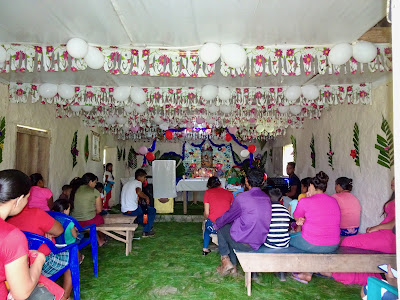 |
Before Mass in Debajiados. Many more arrived latger.
|
Tomorrow, two sisters from a project near Tegucigalpa that provides five years of free education of poor kids will be in the parish to administer the entrance exams and interview the kids and their parents. A fair number of our parishioners have their kids in the program which goes from seventh grade to the end of high school. The kids also have opportunities to learn skills and the girls’ campus has a large pool where they learn how to swim! The programs also help some kids get into the university. It has been a good experience for many. I know of one young guy who got an internship with the mechanics section of Toyota in Tegucigalpa and who hopes to get a job with them.)
We hope to start later this year or early next year some workshops on basic trades. Caritas Santa Rosa de Copán has been offering some in their installations in Santa Rosa but they are also willing to send instructors out to the parishes. I hope we can get this going.
But so much more is needed – not just small efforts, but real social and cultural changes.
I’ll try to keep you informed of what is happening – both in terms of the actual situations and also whatever local efforts we are able to initiate.
One final note.
This week five stained glass windows were installed in the church in Dulce Nombre.


